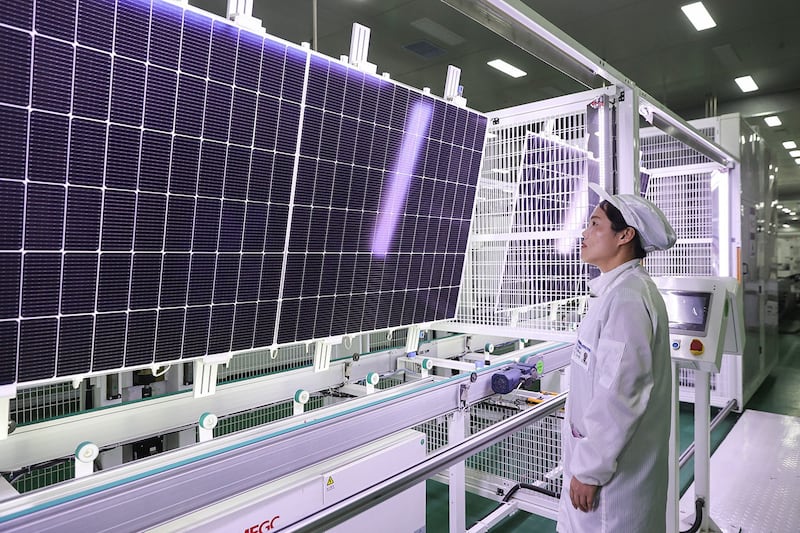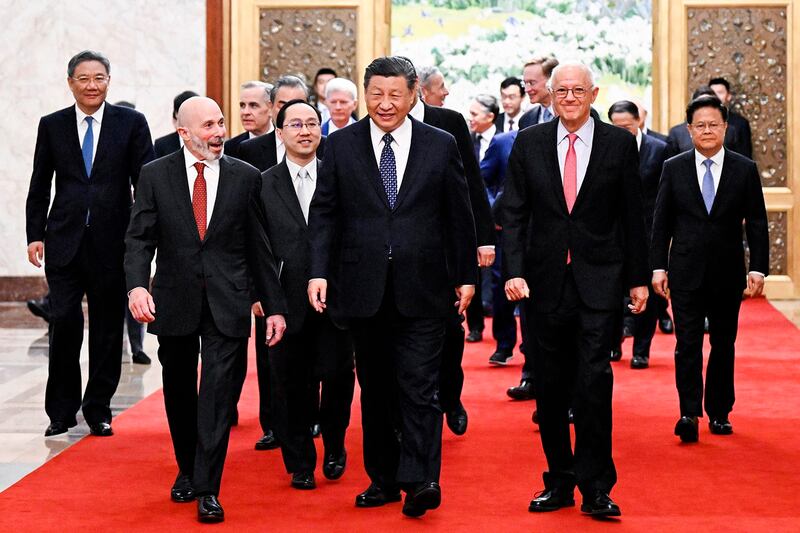U.S. Treasury Secretary Janet Yellen on Wednesday accused China of manipulating global markets for green energy by exporting a “flood” of subsidized products, which she said suppresses the development of competing industries in other countries around the world.
The remarks came a day after China filed a complaint against the United States at the World Trade Organization accusing it of improperly subsidizing only electric vehicles without Chinese-made batteries.
Speaking at the Suniva solar-cell manufacturing plant in Norcross, Georgia, as part of the American-owned firm’s reopening of a shuttered factory, Yellen credited tax credits in the Biden administration’s 2022 Inflation Reduction Act for getting the solar plant back open.
“A flood of solar imports at artificially low prices due to heavy foreign government subsidies made it too hard to compete, and Suniva filed for bankruptcy in 2017,” Yellen said, adding that the “unfair competition” meant the company could not compete without a leg up of its own.
“In particular, I am concerned about global spillovers from the excess capacity that we are seeing in China,” she said. “China’s overcapacity distorts global prices and production patterns and hurts American firms and workers, as well as firms and workers around the world.”

The inability of other companies to compete with subsidized Chinese rivals was also creating “concentrated supply chains” that threaten the stability of global markets if China cuts off supply, Yellen said, adding that she planned to raise the issue on her next trip to Beijing.
She singled out the solar industry, electric vehicles and lithium-ion batteries as the main areas where an artificial oversupply exists.
Takes one to know one
In a complaint to the World Trade Organization on Tuesday, China accused the United States of engaging in similar practices using the Inflation Reduction Act’s tax credits for U.S.-made electric cars.
Beijing asked for the body's dispute-settlement mechanism – which has been effectively shut down by the United States for the last five years – to adjudicate on whether the tax credits violate its rules.
Under the Inflation Reduction Act, American consumers can claim a $7,500 tax credit if they buy an electric vehicle – so long as it does not contain battery parts from a “foreign entity of concern,” a label squarely directed at China, which dominates the lithium-ion battery market.
In its complaint, China’s Ministry of Commerce said that the selective tax breaks are unfairly discriminatory and distort global markets.
The disputes over trade rules are also the latest example of slowly creeping tensions in the U.S.-China relationship following the detente declared during the summit in San Francisco between U.S. President Joe Biden and Chinese President Xi Jinping late last year.
American authorities last week accused China's Ministry of State Security of orchestrating a yearslong, massive computer hacking program that targeted American lawmakers, the White House, the State Department, academics and Chinese dissidents living in the United States.
That followed warnings from FBI Director Christopher Wray and other intelligence leaders that China was directing hackers to gain access to software controlling critical U.S. physical infrastructure to potentially "wreak havoc" on the United States if ordered to do so by Beijing.
No breakdown
The tensions seem far from boiling over, though.
In a meeting with American CEOs and other business leaders in Beijing on Wednesday, Xi indicated he still wanted to keep bilateral relations calm, according to a report by state mouthpiece Xinhua.
Attendees included Blackstone CEO Stephen Schwarzman, FedEx CEO Raj Subramanium, Qualcomm CEO Cristiano Amon and Mark Carney, the chairman of Bloomberg. The U.S.-China Business Council, which organized the meeting, said the meeting was to "discuss our concerns over the decline in trade" between the two countries.

Xi “listened attentively to his U.S. guests,” Xinhua reported.
“The two countries' respective success is an opportunity for each other,” Xi was quoted as saying. “As long as both sides see each other as partners and show mutual respect, coexist in peace and cooperate for win-win results, China-U.S. relations will get better.”
Edited by Malcolm Foster.
